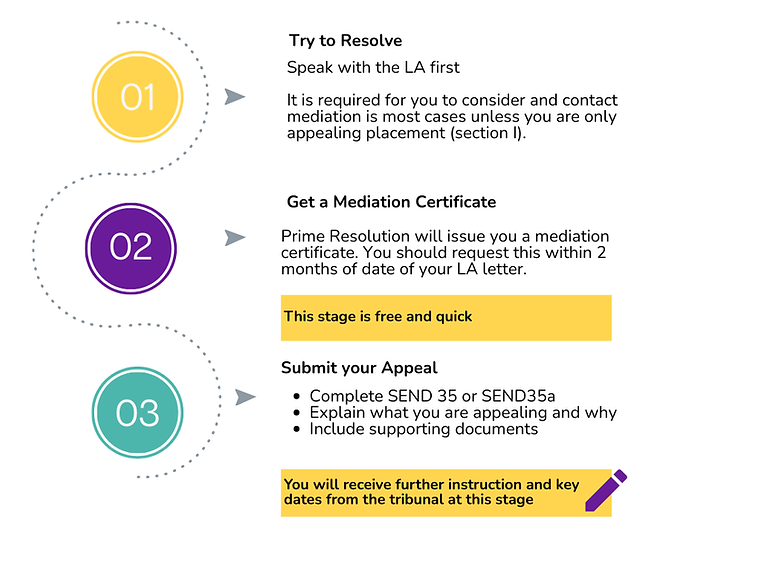Support with SEND Tribunal Appeals
The SEND Tribunal (First-tier Tribunal for Special Educational Needs and Disability) is an independent, national body that reviews decisions made by Local Authorities and schools regarding EHC needs assessments, EHC plans, and disability discrimination.
Appeals are completely free for parents and young people.
The Tribunal Process

.png)

Preparing for Tribunal
Getting organised early will help you feel more confident and avoid last-minute stress.
1. Organise your paperwork
Keep everything in date order and label clearly (e.g. “School Reports,” “Medical Evidence,” “Emails with LA”).
Use dividers or sticky tabs so you can find things quickly during the hearing.
Keep a digital copy as well as a paper copy.
2. Send copies to the Tribunal and the LA
The Tribunal will tell you exactly where and how to send documents.
Send only what’s relevant to your case: keep it clear and focused.
3. Understand the Tribunal’s “case directions”
These are instructions in your registration letter and later correspondence.
They set out what you need to do, and by when (e.g. submit evidence, confirm witnesses).
Missing a deadline can mean your evidence isn’t considered.
4. Submit evidence by the deadline
Evidence can include professional reports, school records, therapy notes, or your own written statement.
If you get new evidence after the deadline, ask the Tribunal for permission to add it.
5. Identify and confirm any witnesses
Witnesses can be professionals, such as teachers, therapists, or medical specialists, who have direct knowledge of your child’s needs.
Ask them early so they can keep the date free.
They can attend in person, by video, or submit a written statement.
6. If you need a witness summons
In some cases, the Tribunal can order someone to attend if they have essential information but are unwilling to come voluntarily.
Apply as soon as possible, explaining why their evidence is important.
The Bundle
The bundle is the complete set of evidence for the Tribunal, prepared by the Local Authority.
It should be sent to you at least 2 weeks before the hearing.
Check that all your evidence is included, and read through the LA’s evidence too.
Highlight or mark pages you may want to refer to at the hearing.
The Hearing
Your Tribunal hearing is the chance to explain your case and answer questions from the panel. It can feel daunting, but knowing what to expect can make the day much easier.
Where and How it Takes Place
Online (video hearing): Most hearings are now held by secure video link. You'll receive instructions from the Tribunal in advance and can ask for a test run to check your technology.
In-person: If your hearing is face-to-face, it will be at a neutral venue (often a court or hearing centre).
Watch this short guide on joining, using the platform and what the screen will look like.
What the Tribunal is like
The SEND Tribunal is inquisitorial, not adversarial. This means:
The panel asks most of the questions – you won’t be “cross-examined” like in a TV courtroom drama.
The judge will lead the hearing, making sure everyone has a fair chance to speak.
Experts on the panel may ask you questions to clarify your points.
Watch: What is a Tribunal Like? for a walk-through of the set-up and process.

How to present yourself
Be polite, clear and honest. Stick to facts and avoid long tangents.
Address the judge as 'Sir' or 'Madam'
Stay calm and composed - even if you feel frustrated.
Answer questions directly - if you don't know, it's fine to say so.
Have your written summary of your case. This will help you to stay on track.
Make notes as the hearing progresses, especially if something is said that you want to respond to.
Have your evidence organised and labelled so you can find it quickly if asked.
Making the Most of your Hearing
Watch: Appeals - What to Expect and Hearing FAQ's which answer common concerns



After the Hearing
Decision Timeline
The Tribunal will send you a written decision, usually within 2 weeks (sometimes longer in complex cases).
The decision will be sent to you and to Shropshire Council.
If the Tribunal Agrees with You
The LA must comply with the order within the set timeframe (usually 2–5 weeks depending on the order type).
For EHCP cases, this may mean issuing a new plan, amending sections, or naming a school/college.
If the LA Does Not Comply
You can write to the LA case officer referencing the Tribunal order.
If needed, you can escalate to the SEND Tribunal Enforcement team or contact SENDIASS for support.
If the Tribunal Does Not Agree with You
You can request a statement of reasons within 1 month of the decision.
You may be able to appeal to the Upper Tribunal on a point of law (seek legal advice quickly).

How Shropshire SENDIASS Can Help
We can:
-
Explain your appeal rights
-
Help you complete and check appeal forms
-
Clarify deadlines and processes
-
Support you to prepare your case
-
Signpost to legal aid and advocacy


